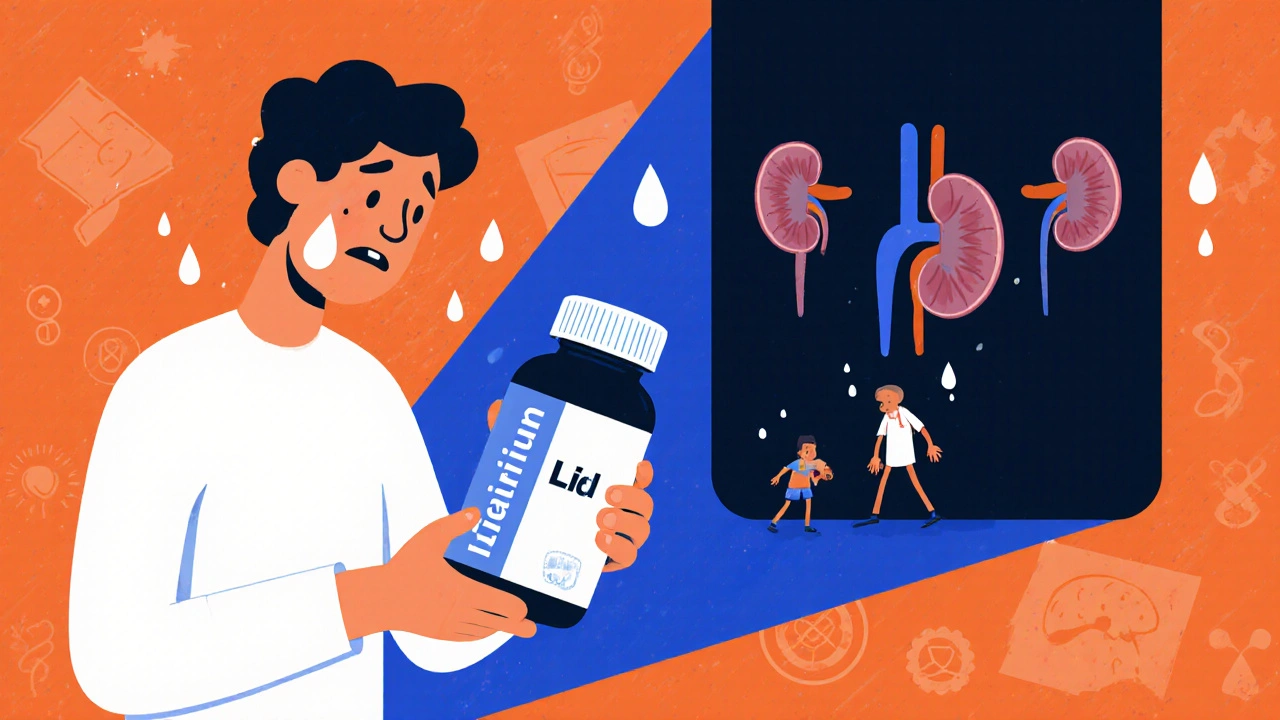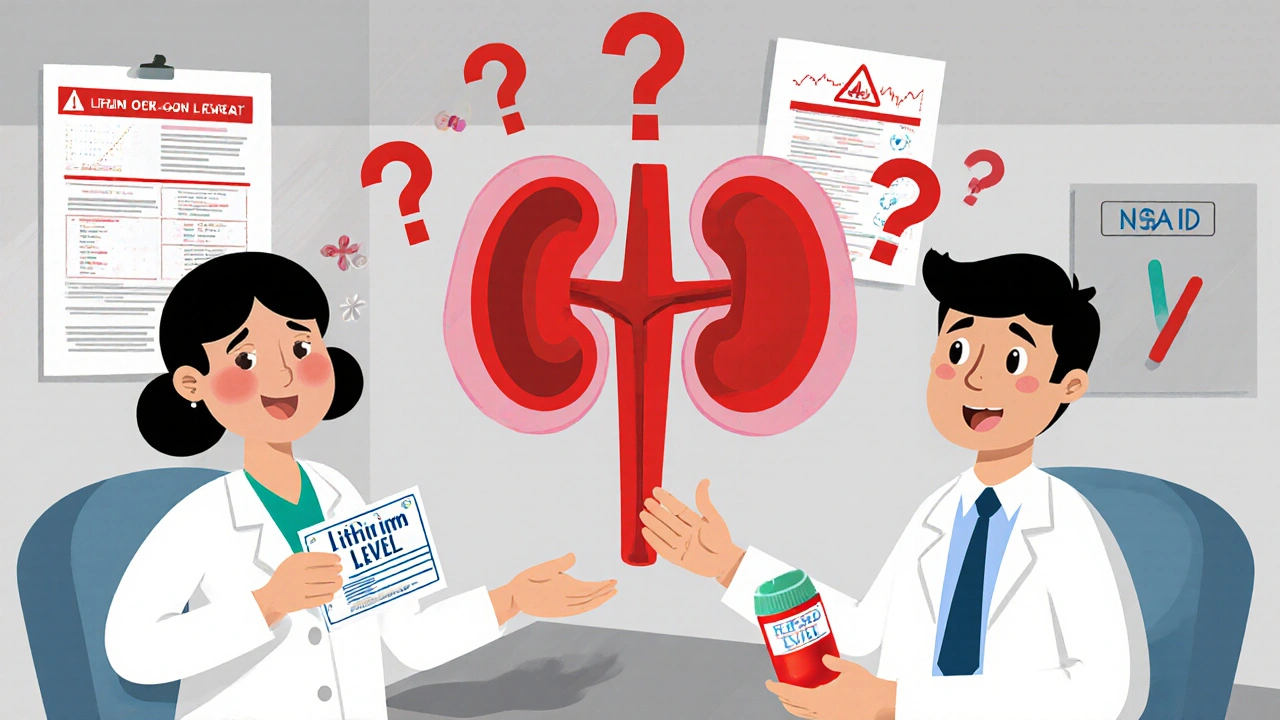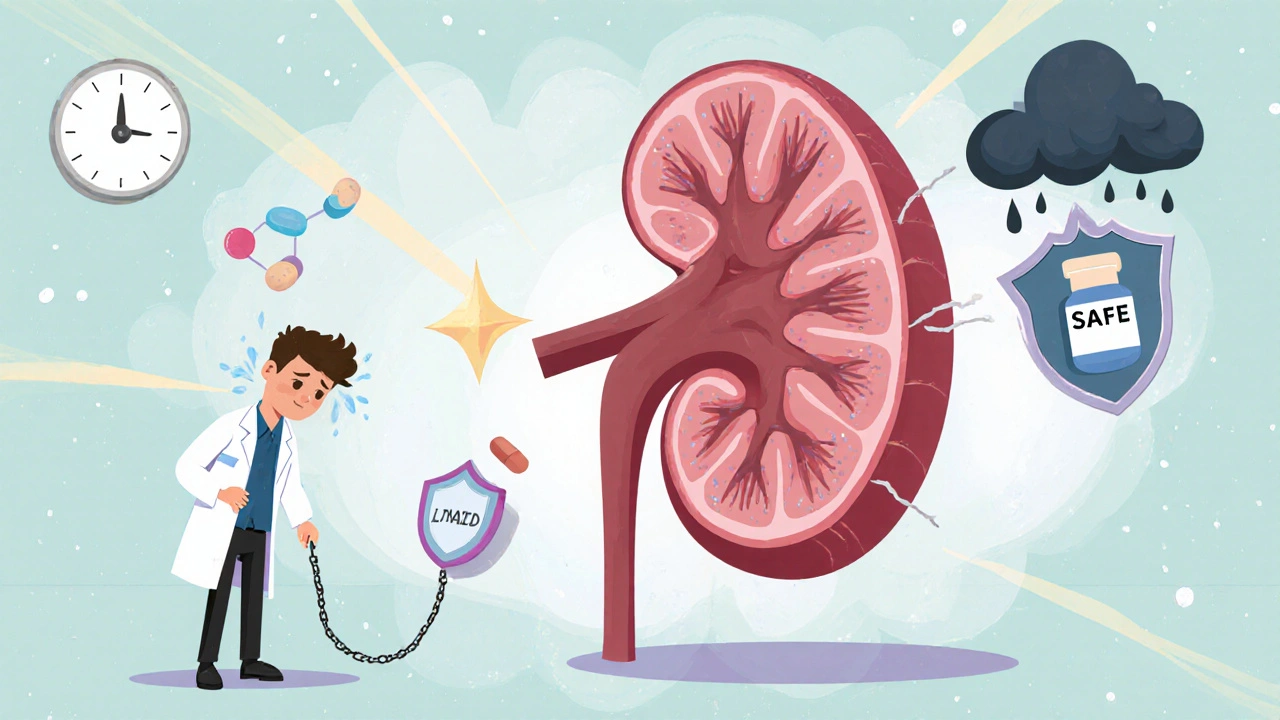Lithium and NSAIDs: Understanding the Dangerous Kidney Risks

Why Mixing Lithium and NSAIDs Can Be Life-Threatening
If you're taking lithium for bipolar disorder, you've likely been warned about salt, caffeine, or diuretics. But one of the most dangerous, yet often overlooked, interactions is with common painkillers like ibuprofen or naproxen. These NSAIDs don't just cause stomach upset-they can push lithium levels into the toxic range, sometimes within just a few days. The result? Tremors, confusion, kidney damage, or even hospitalization. This isn't theoretical. Real patients are ending up in the ER because their doctor didn't connect the dots between a simple painkiller and their mood stabilizer.
Lithium has been used for over 50 years to prevent manic and depressive episodes. It works. But it's also one of the most finicky drugs out there. Your body needs to clear it through the kidneys, and even small changes in kidney function can cause lithium to build up. NSAIDs-taken by millions for headaches, arthritis, or back pain-do exactly that. They reduce blood flow to the kidneys, which slows lithium clearance by 25% to 60%. That’s not a small tweak. That’s a red alert.
How NSAIDs Break Down Lithium Clearance
Your kidneys rely on tiny signaling molecules called prostaglandins to keep blood flowing properly. NSAIDs block the enzymes (COX-1 and COX-2) that make these prostaglandins. Without them, your kidneys tighten up. Blood pressure drops inside the filtering units, and your kidneys start holding onto everything-including lithium.
It’s not just one NSAID. The risk varies. Indomethacin is the worst offender, potentially raising lithium levels by 40-60%. Piroxicam and ibuprofen can push it up 25-35%. Even celecoxib, often called a "safer" NSAID, still increases lithium by 10-15% in people with existing kidney issues. Aspirin and acetaminophen? Minimal effect. That’s why acetaminophen is the first choice for pain relief if you're on lithium.
And it doesn’t take long. Studies show lithium levels start climbing within 24 to 48 hours of taking an NSAID. For many, the first sign of trouble isn’t a lab test-it’s shaking hands, nausea, or feeling foggy. By then, the damage may already be done.
The Double Hit on Your Kidneys
Lithium doesn’t just sit in your blood. It gets into kidney cells and interferes with their normal function. It blocks a key enzyme (GSK-3β), which leads to toxic buildup inside the cells. Meanwhile, NSAIDs starve those same cells of blood flow. Together, they’re like pouring acid on a wound that’s already been cut.
A 2023 study in JAMA Network Open found that people taking both drugs had a 3.2 times higher risk of acute kidney injury than those on lithium alone. The highest risk? The first 30 days after starting the NSAID. And if you’re over 65? The risk jumps even higher. Older kidneys are already slower at clearing lithium. Add an NSAID, and you’re playing Russian roulette with your kidney function.
What’s worse? This isn’t rare. One study of 478 nephrology clinics found that nearly 4 out of 10 cases of lithium-related kidney injury were directly tied to NSAID use. And in many of those cases, the patient had never been warned.

Who’s Most at Risk-and Why Doctors Miss It
It’s not just the elderly. Anyone with reduced kidney function-even slightly-is at higher risk. If your eGFR is below 60 mL/min, you’re already in danger zone. But the real problem isn’t just the patient. It’s the system.
Most people don’t get their lithium from a psychiatrist. They get their ibuprofen from their primary care doctor, their orthopedist, or even their pharmacist. And many of those providers don’t know lithium and NSAIDs are a deadly combo. A 2023 survey found that only 58% of primary care doctors correctly identified NSAIDs as high-risk for lithium users.
Reddit threads are full of stories from people who took Advil for a headache and ended up in the hospital. One user wrote: "I took two ibuprofen for my back pain. Two days later, I couldn’t walk straight. My hands shook. I thought I was having a stroke." Another: "My doctor gave me naproxen for arthritis. I didn’t tell him I was on lithium. I ended up with permanent kidney damage."
These aren’t outliers. A 2022 case series of 17 patients with lithium toxicity found that 82% had taken an NSAID. Six of them-over a third-suffered permanent kidney damage.
What You Should Do If You’re on Lithium
Here’s the bottom line: avoid NSAIDs if you can. Always.
For pain relief, start with acetaminophen (Tylenol). Stick to 3,000 mg a day max to protect your liver. If that’s not enough, talk to your doctor about tramadol. It’s not perfect, but it doesn’t touch your kidneys the way NSAIDs do.
If you absolutely must take an NSAID-say, for a short flare of arthritis-do it with extreme caution:
- Use the lowest dose for the shortest time possible (no more than 5-7 days).
- Drink at least 3 liters of water a day. Hydration helps your kidneys flush lithium.
- Get your lithium level checked within 48-72 hours of starting the NSAID.
- Your doctor may need to lower your lithium dose by 25-50% during this time.
- Check your kidney function (creatinine and eGFR) every week while you’re on the NSAID.
And don’t assume the danger ends when you stop the NSAID. The effect lingers. Lithium clearance stays reduced for 7 to 10 days after the last dose. That’s why you still need monitoring even after you’ve stopped the painkiller.

What Your Doctor Should Be Doing
Guidelines from the American Society of Nephrology and the European Psychiatric Association are clear: avoid this combo. If you must use NSAIDs, you need twice-weekly lithium checks and weekly kidney tests for the first month.
But in real life? Most clinics don’t follow this. A 2021 audit found only 62% of lithium-prescribing doctors included NSAID warnings in patient handouts. Compare that to 99% who warn about diuretics. Why the gap? Because this interaction is under-recognized.
Some hospitals are fixing it. Kaiser Permanente cut lithium-NSAID co-prescribing from 32% to under 12% by adding hard alerts in their electronic system and forcing doctors to justify the combo. The Veterans Health Administration? Only managed a 15% drop. The difference? Consistent enforcement.
If your doctor prescribes an NSAID without asking about lithium, speak up. Ask: "Is this safe with my mood stabilizer?" If they say yes without checking your levels or kidney function, get a second opinion.
The Bigger Picture: Why This Keeps Happening
Lithium is one of the most effective drugs for preventing suicide in bipolar disorder. Studies show it cuts suicide risk by 44%. No other mood stabilizer comes close. So we can’t just stop using it.
But we also can’t keep letting people take ibuprofen without a warning. The FDA added a boxed warning to lithium labels in 2021. The European Medicines Agency now recommends electronic systems block NSAID prescriptions for lithium users unless a nephrologist signs off.
And yet, in 2023, nearly 29% of lithium users still got at least one NSAID prescription. Among those over 65? Nearly 40%. That’s not negligence. That’s a system failure.
The solution isn’t just better warnings. It’s better communication. Psychiatrists need to send clear notes to primary care providers. Pharmacists need to flag these interactions at the counter. Patients need to carry a lithium warning card.
What’s Next: Safer Options on the Horizon
There’s new hope. A 2023 clinical trial tested a new drug that mimics kidney-protecting prostaglandins without interfering with lithium clearance. Early results showed it cut lithium level spikes by 87%. If it works in larger trials, it could one day allow safe NSAID use for lithium patients.
For now, though, the safest path is simple: avoid NSAIDs. Use acetaminophen. Stay hydrated. Get your levels checked. And never assume a painkiller is "just a painkiller" when you’re on lithium.
This isn’t about fear. It’s about awareness. One conversation, one test, one warning could prevent a lifetime of kidney damage-or worse.
15 Comments
Mary Follero
I was on lithium for years and never knew NSAIDs were this dangerous. My doc never mentioned it. I took ibuprofen for my migraines like it was candy. Thank you for this post - I’m getting my kidney levels checked this week. You saved me from a disaster.
Will Phillips
THEY KNOW. THEYve been hiding this for decades. Big Pharma doesn't want you to know you can get kidney failure from a bottle of Advil. Why? Because they make billions off dialysis. Lithium is cheap. Kidney transplants? Priceless. Wake up people.
Arun Mohan
How quaint. In India, we’ve known for decades that Western medicine is a house of cards. Lithium? A 1950s relic. NSAIDs? Overprescribed by clueless GPs. The real issue is that you all outsource your mental health to chemicals while ignoring yoga, Ayurveda, and fasting. But of course, your pharma-funded psychiatrists won’t tell you that.
Tyrone Luton
It’s not just the drugs. It’s the alienation. We live in a world where pain is medicalized, not understood. Lithium doesn’t fix loneliness. NSAIDs don’t heal trauma. But we’ve reduced human suffering to a biochemical equation - and now we’re surprised when the equation breaks. We’re not treating illness. We’re treating symptoms of a broken system.
Jeff Moeller
Acetaminophen is the way. No drama. No risk. Just relief. Simple.
Herbert Scheffknecht
Think about it - lithium’s been around since the 1940s. It’s one of the oldest mood stabilizers. And yet, we still don’t have a reliable way to monitor its safety in real time. No smart pill. No wearable. No AI alert system. We’re still relying on blood draws and patient memory. That’s not medicine. That’s guesswork dressed in a lab coat. And now we’re surprised when people get hurt? We need tech. We need innovation. Not just warnings on a pamphlet.
Jessica Engelhardt
Oh please. You think this is about health? This is about control. Lithium makes people docile. NSAIDs are banned because they want you dependent on the system. If you could just take ibuprofen and feel fine, why would you keep seeing the shrink? Wake up. This is mind control wrapped in medical jargon.
Martin Rodrigue
While the clinical evidence presented is compelling, one must also consider the heterogeneity of patient populations. The risk stratification outlined is statistically sound, yet the generalizability to non-Western healthcare systems remains unexamined. Furthermore, the reliance on self-reported NSAID usage introduces significant recall bias. A prospective cohort study with pharmacokinetic monitoring would provide stronger evidence.
Sherri Naslund
Wait so you're telling me my doctor gave me naproxen for my back pain and didn't even ask if i was on lithium?? that's not just negligence that's criminal. I had kidney pain for weeks after and thought i had a UTI. I'm lucky i didn't die. Why do they even let these doctors have licenses? And why does no one talk about this? It's like they want us to suffer.
Ashley Miller
So what’s next? Are they gonna ban water too? Next thing you know, they’ll say breathing too hard can cause lithium toxicity. You know what’s really dangerous? Trusting doctors who didn’t even pass med school in the 21st century.
Lauren Hale
This is exactly why I hand out lithium safety cards to every patient I see. I keep a printed version in my wallet. I give one to every family member. I’ve had patients come back and say, ‘I didn’t take that Advil because I remembered your card.’ That’s the power of simple, clear communication. We can fix this - one conversation at a time.
Greg Knight
Look, I’ve been on lithium for 12 years. I’ve had two flares where I needed pain relief. I used acetaminophen both times. I drank water like it was my job. I got my levels checked within 72 hours. It’s not hard. It’s not expensive. It’s just inconvenient. But your kidneys? They don’t care about inconvenience. They just work. So do the work. Your future self will thank you.
rachna jafri
They say lithium saves lives but what they dont say is it turns you into a zombie. And now they wanna take away ibuprofen too? Who are they to decide what pain I feel? I’ve seen people on lithium who look like ghosts. No joy. No rage. Just flat. Maybe the real problem isn't the NSAIDs - maybe it's the damn drug itself. They don't fix the mind. They just mute it.
darnell hunter
While the post presents a compelling clinical narrative, it lacks citation of primary data sources for the 82% statistic referenced. Furthermore, the assertion that "permanent kidney damage" occurred in six of seventeen patients requires clarification of diagnostic criteria. The absence of nephrology consultation data undermines the causal inference. A more rigorous approach is warranted.
Hannah Machiorlete
My ex took lithium and ibuprofen for a week after his back surgery. He went from laughing to crying in 48 hours. Then he stopped talking. We thought it was depression. Turns out his lithium was triple the safe level. He’s fine now but he’s not the same. No one warned him. No one asked. I’m never trusting a doctor again.

Write a comment